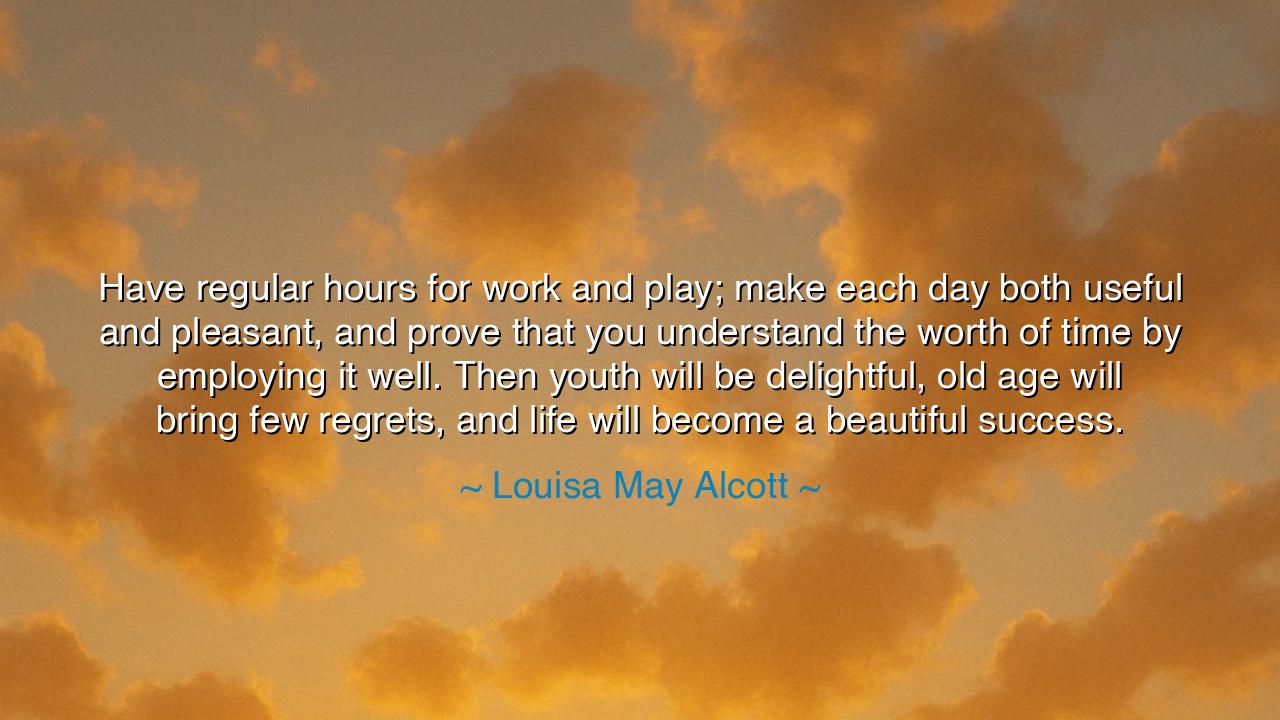
Have regular hours for work and play; make each day both useful
Have regular hours for work and play; make each day both useful and pleasant, and prove that you understand the worth of time by employing it well. Then youth will be delightful, old age will bring few regrets, and life will become a beautiful success.






"Have regular hours for work and play; make each day both useful and pleasant, and prove that you understand the worth of time by employing it well. Then youth will be delightful, old age will bring few regrets, and life will become a beautiful success." — Louisa May Alcott
In this timeless wisdom, Louisa May Alcott speaks to the very essence of a well-lived life, a life that strikes a balance between the sacred duties of work and the joyous respite of play. She urges us to establish regular hours, to carve out spaces for both toil and rest, for work without play is but a burden, and play without purpose is an idle escape. She calls for a harmony that allows each day to be both useful and pleasant, and by doing so, we find the true worth of time—in how we live it, how we spend it, and how we measure it. Through this, we are promised that youth will be a season of joy, and old age a time of satisfaction, with few regrets when the final days arrive.
Alcott’s words are not mere advice; they are a declaration of the sacredness of time, and how we must use it as our greatest treasure. The young often squander time, seeking endless distractions, while the old lament its fleeting nature. But she offers a different path—a way of being that ensures that time does not escape us, but rather is embraced and valued. When we work diligently, with purpose and commitment, and play joyfully, with gratitude and abandon, we are cultivating a life that is rich in meaning and fulfillment.
In ancient Greece, Socrates imparted a similar lesson, emphasizing the importance of a balanced life. He encouraged his disciples to dedicate time not just to intellectual pursuits, but to play—a practice of leisure that nurtures the soul and provides clarity of thought. Socrates understood that the human spirit needs moments of rejuvenation, as much as it requires labor to achieve mastery and wisdom. His life is a testament to this balance, for though he spent much time in discourse and debate, he also celebrated the joy of friendship and the pleasures of a well-lived day.
In more modern times, consider the story of Leonardo da Vinci, a master of both art and science. Da Vinci, although renowned for his diligent study and work in the fields of painting, anatomy, and engineering, understood the value of play. He often indulged in leisurely pursuits, such as observing nature, sketching for enjoyment, or experimenting with new ideas outside the confines of his formal work. This balance between focused effort and playful curiosity allowed him to achieve a legacy of genius, showing us that it is in the balance of work and play that true greatness is achieved.
Alcott’s wisdom finds resonance in these examples. It is not enough to work hard; one must also enjoy the labor. It is in the moments of lightness, of play, that the soul finds its rhythm, its joy, and its energy to continue. As Socrates and Leonardo understood, life is not meant to be a constant grind, nor should it be one endless pursuit of pleasure. A life that is a beautiful success is one that has mastered the art of balancing the useful with the pleasant, the serious with the joyous.
The practical wisdom in Alcott’s quote lies in our ability to regulate our time—to structure our days in such a way that we give ourselves both the responsibility of work and the freedom of play. This means setting clear boundaries for both, not allowing the scales to tip too far in one direction. We must be mindful of how we use our time: making sure that every day has its purpose and its pleasure. Whether we work in our chosen craft, study with diligence, or spend moments of joy with loved ones, we must give each moment the attention it deserves.
Thus, the lesson is clear: if we wish for youth to be delightful and old age to be filled with contentment, we must learn to respect and value time. It is the wise who see time as a gift, not a resource to be hoarded or squandered, but a precious thing to be used well. Every day must be both a day of purpose and a day of joy, for in doing so, we will look back with few regrets and ahead with hearts full of peace. Let us take this wisdom into our own lives, shaping each day with the understanding that balance in all things is the key to a beautiful, successful life.






AAdministratorAdministrator
Welcome, honored guests. Please leave a comment, we will respond soon